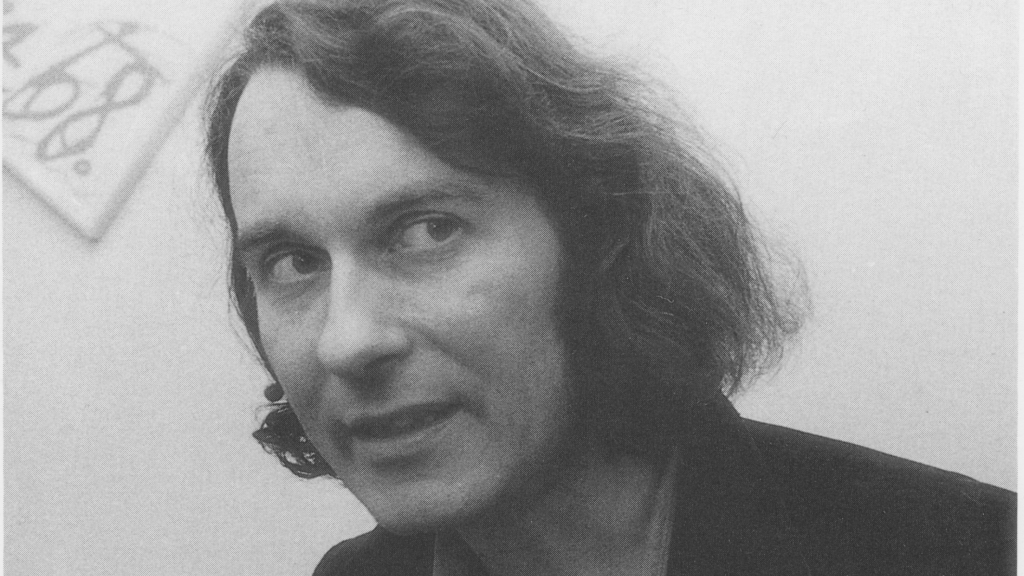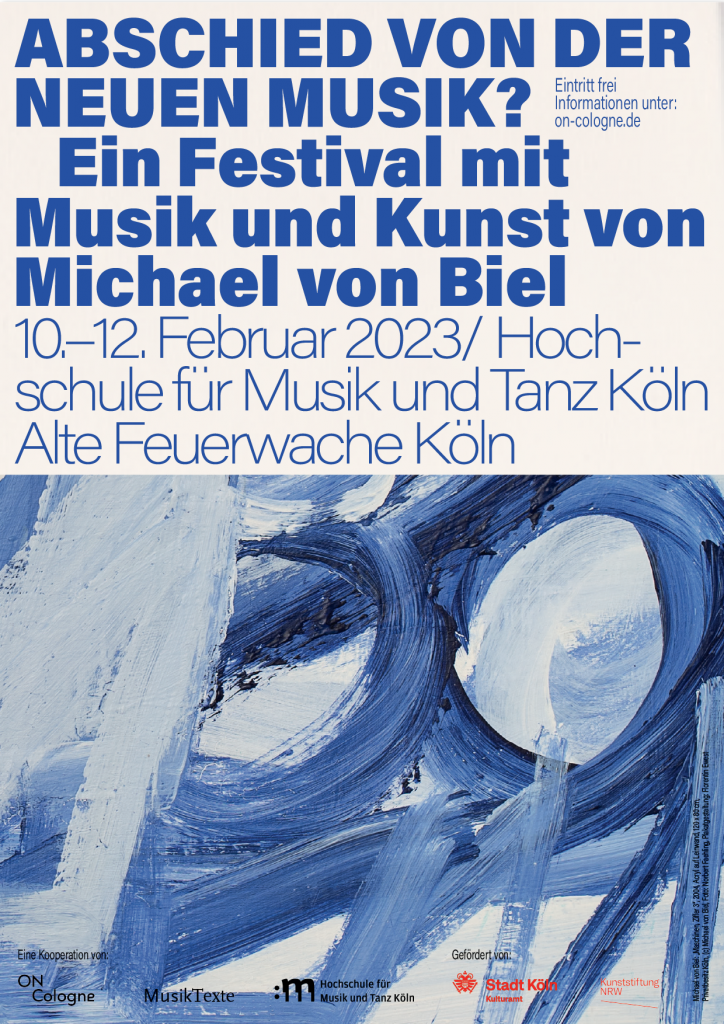
Abschied von der neuen Musik?
Ein Festival mit Musik und Kunst von Michael von Biel
February 10-12
At the Hochschule für Musik und Tanz Köln and the Alte Feuerwache.
Program below the article.
By Rainer Nonnenmann
Is it incompetence when an artist evades common definitions of discipline, form and craft? Is it mere dilettantism when he experiments with cello, guitar or piano and, as in the rock music of the 1960s, immediately produces sounds physically and lets them take effect without ever having really learned the instruments? What is to be thought of a composer who renounces the traditional categories of work, genius and success just as much as the avant-garde drive for innovation? Is it perhaps this artist who most radically unites art and life, when he opens up alternative perspectives beyond a bourgeois profession, fixed residence and family status, with all the more personal freedom, wanderlust and drug consumption?
Michael von Biel, born in Hamburg in 1937, is an exceptional phenomenon between music, visual art and literature, between European traditions, the American avant-garde and pop, dance, rock and pop music. Yet his beginnings certainly promised a straightforward career. In 1960 he studied privately with Morton Feldman in New York, and in 1962 he received the composition prize of the Darmstadt Summer Course. There, in 1964, he also achieved a scandalous success with his noisy second string quartet, which caused a furor and left the experts perplexed. His “Jagdstück” for ensemble and three garden grills – premiered in 1968 at WDR Cologne – set an anarchic counterpoint to the “pure teachings” of dodecaphony, serialism, aleatorics and Fluxus.
But von Biel increasingly moved away from the idea of writing scores and supplying performers with sheet music. Instead, he preferred to improvise on electronically distorted cello or electric guitar, teamed up with the Cologne avant-garde band CAN, and played at happenings. Finally, he went to study with Joseph Beuys at the Düsseldorf Art Academy and created hundreds of drawings and paintings over the following decades, incorporating extraneous materials, texts, postcards, photographs, and models from art history. It was only later that he sporadically wrote string quartets, guitar and piano pieces again. The unadjusted work of the artist, born in 1937, can now be rediscovered from February 10 to 12, 2023.
The festival “Abschied von der neuen Musik?” is organized by MusikTexte, ON Cologne and Cologne University of Music and Dance (HfMT). Four concerts will present works from all of Biel’s creative phases, from material expansions and conceptual openness to neo-tonal simplicity and improvisational spontaneity. The venues are the concert hall of the HfMT Cologne as well as the hall of the Alte Feuerwache Cologne, where visual works by Michael von Biel will also be exhibited. The performers are pianist Thibaut Surugue, the Asasello Quartet, members of the Cologne Guitar Quartet, as well as HfMT Cologne’s Ensemble ColLAB Cologne and other students of the university under the direction of Susanne Blumenthal.

Friday, February 10
Fluxus – Eröffnungskonzert
Hochschule für Musik und Tanz Köln, 7PM
Einführung: Dr. Hermann-Christoph Müller
The Plain Near S’Cairn / Ebene bei S’Cairn für mindestens fünf Streicher und mindestens fünf Bläser (Textpartitur) (1963), opus 7
Fassung elektronische Musik für vier Lautsprechergruppen (1963)
Welt 2 Action score für Melodieinstrumente, Stimme, Körperklänge, Klavier, Gitarre, Schlaginstrumente Alltagsgegenstände aller Art (6 bis 15 Spieler) (1965)
deklination für Lautsprecher, sieben Instrumentalisten und (Alt)Stimme (1965)
Komposition für großes Orchester (1968), Aufführung eines sinfonischen Werks auf durch Tücher abgedeckten Instrumenten
Ensemble ColLAB Cologne der HfMT Köln und ColLAB Cologne Orchestra
Juliane Bogner, Alt
Simon Spillner, Klangregie
Susanne Blumenthal, Leitung
Mitschnitt Deutschlandfunk Köln
Saturday, February 11
Neue Einfachheit? – Kammermusik
Alte Feuerwache, Halle, 5PM
Traditionelle Stücke für zwei Gitarren, Hefte 1–3 (1974–1985) opus 16/17
IV „Andante“ aus Heft 1 (1974)
II „Con moto“ und III „Listesso tempo“, aus Heft 3 (1976/77)
VI „Andante Cantabile“, aus Heft 1 (1974)
VIII „Con moto (Thema und Variationen)“, aus Heft 3 (1976/77)
Doubles für Violine und Klavier (1961/62) opus 2
Zwei Sätze für zwölfsaitige und spanische Gitarren Tempo I und Tempo II, aus „Traditionelle Stücke“ Heft 4 (1976)
Improvisation für zwei elektrische Gitarren, Sätze 1-4, aus Heft 6 (1981/83)
Vier Stücke für zwei Gitarren (2001), Sätze 3 und 4, opus 30
Tal Botvinik und Tobias Juchem, Gitarre
Rostislav Kozhevnikov, Violine
Thibaut Surugue, Klavier
Mitschnitt Kulturradio WDR3
Saturday, February 11
Konzeption – Improvisation
Alte Feuerwache, Halle, 7:30PM
28 Stücke für Klavier Auswahl (1987–1989)
Klavier-Solo Nr. 3 (1980/81)
11 Stücke für Klavier, Auswahl (1989–1992)
Etüden und Gesangsthemen für Klavier (1968)
Thibaut Surugue, Klavier
Mitschnitt Kulturradio WDR3
Sunday, February 12
Quartett – Quetsch
Alte Feuerwache, Halle, 11PM
Quartett für Streicher Nr. 2, 1963/64, opus 6
Quartett mit Begleitung für Streichquartett und zweites Violoncello als Begleitinstrument (1965/66), opus 13
Cloches adoreuses Compositionen für Streicher (2007)
Asasello Quartett
Rostislav Kozhevnikov (Violine), Barbara Streil (Violine), Justyna Sliwa (Viola), Teemu Myöhänen (Violoncello)
Niklas Seidl, zweites Violoncello
Mitschnitt Kulturradio WDR3
Free admission. Registration via the venues HfMT and Alte Feuerwache.
A cooperation of ON Cologne, MusikTexte and the Cologne University of Music and Dance. Supported by the Cultural Office of the City of Cologne and the Kunststiftung NRW.